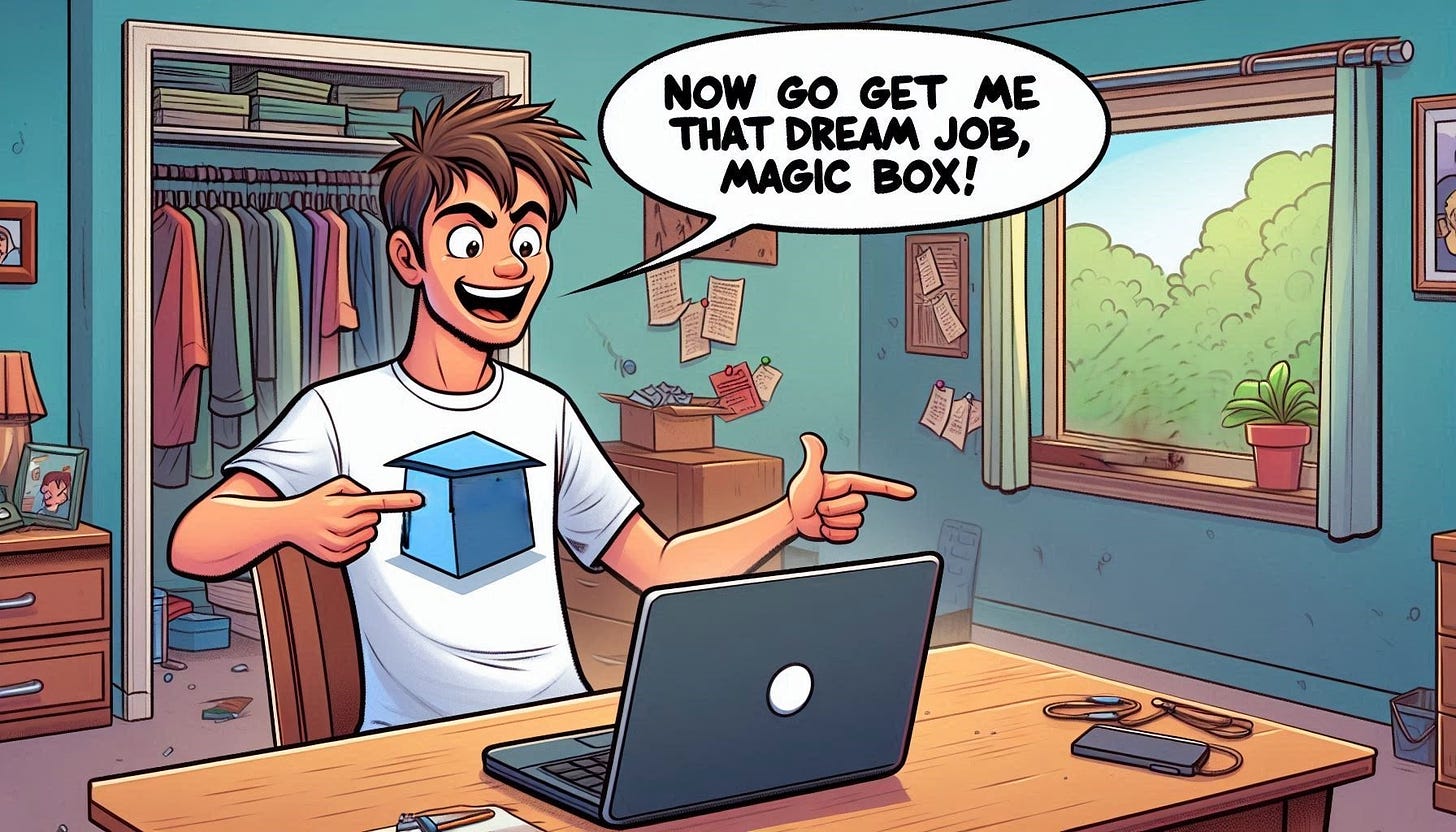I’ve recently been invited to do a guest talk on using AI for job hunting.
That’s when it struck me: In the entire two years of writing this newsletter, I’ve never touched upon this use case.
Yet there are many areas of job search where AI can help.
To many of us, the first thing that immediately springs to mind is, “I’ll just get ChatGPT to write my CV and cover letter for me. Boom! #lifehack”
And, well, yes.
That’s certainly one way to use AI.
But—much like my advice in “The Skeptical Writer's Guide to AI”—you’ll get more value by staying in the driver’s seat rather than outsourcing everything to AI.
AI is best seen as a sparring partner that helps you through all stages of the job hunt.
Here are the ones I’ll cover:
Self-discovery: What are you good at and what are your values?
Upskilling: What gaps exist in your skillset and how can you close them?
Job search: What existing jobs fit your profile and expectations?
Company research: What can you learn about a specific company before applying?
Application process: How do you tailor your CV and cover letter to the job?
Job interview prep: How do you prepare and practice for job interviews?
Feedback analysis: What insights can you gain from any feedback from potential employers?
Decision and negotiation: How do you evaluate job offers and negotiate the best terms?
Now let’s look at each phase in detail and see how AI can help.
Note: I share some “starter prompts” for each step, but they’re mostly there for inspiration. Go ahead and expand them or modify them for your needs. (I’ve been pretty vocal about my stance on copy-pasting off-the-shelf prompts without review.) And remember: You can instantly improve almost any prompt with the “Ask me questions” line.
👀 1. Self-discovery
I know. This sounds like some vague guru mumbo-jumbo.
But before your job hunt even begins, you’ll probably want to take a step back and figure out what you’re after:
What are your professional strengths and weaknesses?
What are your interests and aspirations?
What do you value in a potential employer?
And so on.
The goal is to figure out what career path or type of job best fits your skills and personality.
How AI can help
Any chatbot used in combination with the “Ask me questions” method could make a great sparring partner, helping you with stuff like:
Asking probing questions about your skills, values, etc.
Analyzing your responses to extract insights you might’ve overlooked
Suggesting career paths based on what it learns about you
Relevant AI tools
Most LLMs will work well for this step, but you’ll get the most out of those built especially with empathy and conversations in mind. Some ideas:
ChatGPT with Advanced Voice Mode: If you prefer talking instead of typing, Advanced Voice Mode is the best there currently is. Even as a free user, you get 15 minutes per month to try it. (Here’s how you can get the most out of those 15 minutes.)
Pi: Inflection’s Pi is perhaps the friendliest, most empathetic chatbot out there. That’s exactly what you’ll need at this stage. As a bonus, Pi comes pre-equipped with a decent voice mode, so you can have a regular voice chat with it about yourself.
Starter prompt
"I’m looking to discover my ideal career path. Ask me questions about my skills, interests, values, and goals. Then suggest potential job options that align with my answers."
👨🎓 2. Upskilling
Now that you know what you’re looking for, you might find out there’s a gap between your skills and what your dream job requires.
In this step, you’ll want to uncover these gaps and create a learning plan:
What are the specific skills this kind of role calls for?
How does your current background align with these?
What courses and learning opportunities are out there?
The goal is to move from simply identifying skill gaps to actionable learning opportunities.
How AI can help
You can turn AI into your personal mentor and development coach, getting it to help with:
Comparing your current skills to job requirements to identify knowledge gaps
Finding relevant courses and educational resources
Creating a structured learning plan
Testing your knowledge and giving you feedback
Relevant AI tools
You'll want tools that can find relevant study materials and help you practice. Some options:
Claude: Claude’s great at extracting fresh insights from documents, and its “Artifacts” feature can turn learning materials you upload into a visual and interactive course with quizzes, etc. (See how to do that here.)
NotebookLM: Perfect for turning long info sources into tailored study materials. Its ability to handle almost any input format is great: Throw a video lecture or a PDF of a research paper at it, and it’ll have no issues.
Perplexity: This AI-powered search engine is great for vague, complex queries (e.g. “What courses are best suited for a junior programmer who wants to learn how to lead a team of developers?”)
Starter prompt
“Based on my current background [insert insights from #1], what additional skills will I need for a job as a [job role]. Please suggest some specific learning courses and create a study plan."
🔍 3. Job search
At this point, you know what you’re after and you’ve brushed up on those critical job skills.
Look at you, so productive!
Now comes the part where you actually look for jobs that fit your requirements:
How’s the job landscape looking?
What open positions match your criteria and competencies from steps #1 and #2?
Ideally, you’ll find the perfect match between your experience and available jobs.
How AI can help
AI is great at translating broad queries into searches for specific jobs. It can help you:
Turn broad queries into concrete job titles
Browse for job openings that match your criteria
Spot any emerging trends or patterns in the job market
Relevant AI tools
For this task, you’ll want AI with Internet access, like:
ChatGPT with web browsing.
Perplexity, for the same reasons as point #2.
Starter prompt
"Help me find current job listings that match my profile [key insights from step #1]. Focus especially on roles that require [skills from step #2]. Explain why each job might be a good fit."
🏢 4. Company research
Once you’ve made a shortlist of jobs, it’s time for a closer look at your potential employers. You’ll want to know what makes them tick before you work on your application:
What do current employees say about working there?
What projects and challenges is the company tackling?
How is the business going overall?
Hopefully, you’ll find a few golden nuggets of info to help you make an informed decision and make your application stand out.
How AI can help
Think of AI as your research assistant who actually enjoys reading annual reports.
It can:
Parse and summarize any amount of publicly available info about the company
Spot patterns in employee reviews
Find curious details to mention in your cover letter
Relevant AI tools
It’s best to look for large language models that can handle a lot of context.
NotebookLM, for largely the same reasons as point #2. You can feed it details about a company in almost any format (docs, video, audio, etc.). Gemini’s 2-million-token context window ensures it can absorb lots of info without losing key facts.
Perplexity is great for additional information search to supplement NotebookLM, which doesn’t have direct Internet access.
Starter prompt
"I am applying for [job position from #3]. Please research [company], review [attached files] and provide a summary of its culture, recent achievements, employee satisfaction, and any other insights relevant for crafting an effective application.”
📝 5. Application process
This is it!
It’s time to update your CV and put together that fancy cover letter.
Thanks to everything you’ve done so far, you should have all the building blocks you need.
How AI can help
AI is your sparring partner and beta reader, who’ll help you:
Suggest edits to your CV to best match the specific job
Highlight the most impactful details to include in the cover letter
Review your CV and application drafts to provide improvement suggestions
Of course, you can also get AI to draft the CV and cover letter on your behalf. If that’s your jam, remember to treat AI output as a rough first draft rather than the final product. No matter how good a chatbot is, it isn’t you.
Relevant AI tools
For this step, pick whichever large language model or AI chatbot you enjoy the most. You’ll probably be having a lot of back-and-forth conversations with it, so it helps to settle on the one whose tone and interface you prefer.
I looked at five great free options here:
Starter prompt
"Based on my profile [#1 and "#2], as well as the job description and company insights [#3 and #4], suggest key points to include in my cover letter and edits to my CV. Then, review my drafts and provide feedback for improvement."
🗣️ 6. Job interview prep
Congratulations!
You’ve landed that sweet, sweet job interview!
But wait…this means you have to go to a job interview and talk to a real human person at your dream company.
You might want to prepare for and practice that scenario.
How AI can help
Lucky for you, AI is always happy to chat, and it won’t get bored of practicing the same lines over and over again. AI can be your practice buddy who:
Comes up with possible interview questions and tests based on the role
Prepares you for any job-related skill and personality tests
Suggests questions you can ask the interviewer
Simulates live job interviews and gives you feedback
Relevant AI tools
Voice-enabled chatbots are perfect for this step, letting you conduct as many mock interviews as needed. So:
ChatGPT with Advanced Voice Mode (again)
Pi (again)
Specialized AI tools like Yoodli or InterviewsBy.ai
Starter prompts
1. "I have an interview for [position] at [company - step #4]. Help me generate a list of likely interview questions and skill assessments, as well as answers that reflect my background [#1 and #2]”
2. “Help me practice for my interview for [position]. Use insights about me [#1 and #2] and company research [#4] to simulate an interviewer with [desired interviewer personality]. Mix common and role-specific questions. Provide feedback on my answers and give me suggestions for improvement.
📩 7. Feedback analysis
Sure, you might not land the perfect job after a single interview.
But you’ll likely get a ton of valuable feedback from at least some of the companies you’ve applied to.
Treat all of it as an opportunity to identify your weak areas and work on them.
How AI can help
AI is great at uncovering insights, so use it to:
Spot common patterns across different types of feedback
Identify and prioritize areas for improvement
Suggest specific steps you can take to get better
Relevant AI tools
You’ll want tools that can take fragmented input sources and present insights from these in a coherent, simple format. The usual suspects:
ChatGPT with Code Interpreter (Advanced Data Analysis): The code interpreter can run Python code in the background to do deep analysis and then output insights as visuals like tables and graphs.
Claude with “Artifacts”: Just as with study materials (#2), Claude can turn copy-pasted inputs into helpful visuals, quizzes, and so on.
NotebookLM, for all the reasons mentioned earlier.
Starter prompt
"Here is the feedback I’ve received on my recent job applications and interviews [paste your sources]. Taking into account [insights from all previous steps], help me analyze this feedback, identify key areas for improvement, and suggest specific steps I can take to get better."
🤝 8. Decision and negotiation
You did it!
All your hard work paid off and you’ve gotten a job offer…or perhaps even multiple job offers, you overachiever!
Now all that’s left is evaluating the offer(s), negotiating the best terms, and making the final, potentially life-changing decision.
No pressure.
How AI can help
You can turn to AI for advice and even negotiation practice. It can help to:
Compare offer(s) against industry standards
Analyze the pros and cons of multiple offers
Suggest contract terms to ask for
Simulate mock negotiations
Relevant AI tools
You’re looking for a mix of the above tools. You’ll need some for comparing the offers and others for the mock negotiations:
Offer evaluation:
NotebookLM for analyzing and comparing copy-pasted offer(s)
Perplexity for looking up and benchmarking against industry standards
Negotiation practice:
Starter prompts
1. "I've received a job offer(s) with the following details: [offer details]. How do these compare to industry standards? (In case of multiple offers): What are the pros and cons of each offer, taking my background [previous steps] into account?”
2. “I have decided to accept the following [job offer]. Help me identify and formulate the best contract terms. Conduct a mock negotiation to help me practice."
💡Final thoughts and tips
I hope this gives you some ideas and inspiration for your own job search.1
I want to leave you with a few general points for using AI as a job seeker:
Stay in the driver’s seat: Treat AI as a sparring partner, not your replacement. It’s tempting to outsource some of the thinking to AI, but you learn a lot more by having it give you feedback on your own thought process.
Use the “Ask me questions” method: Every prompt, no matter how basic, will instantly get better if you ask AI to interview you about the task before responding.
Verify AI outputs: This goes especially for critical details like facts about the company, salary ranges, and so on. LLMs can be surprisingly useful, but all of them can easily hallucinate and make up plausible-sounding bullshit. Double-check any important details.
Pick a primary LLM and stick to it: For steps that require conversations with a chatbot, it helps to settle on one go-to LLM. This lets you keep a comprehensive history of your entire job-hunting process for context. You can certainly copy-paste insights between LLMs, but you’ll save yourself the trouble of doing so by sticking to a single ongoing chat with the same language model.2
🫵 Over to you…
What are your thoughts on using AI for job hunting? Have I covered the most relevant phases of job search or are there some I’ve overlooked? Do you know of other ways AI can be used in this context?
Leave a comment or drop me an email at whytryai@substack.com.
Unless, of course, you’re already happily employed. In which case, yay!
Just be aware of any context window limitations it might have.






Very compelling! I recently used Google Gemini 2.0 for an application process and it felt so good having a thinking partner to support that. Didn't realize all of the different aspects of the job hunt process that AI can help out.
Looking forward to trying out some of those other sections!
I love how you recommend many things that are just good for the candidate. The challenge I have is that the employers have been using AI in horrific ways which just muddy up the water. It's funny because in all my interviews where I laid out my knowledge of the company it became painfully obvious I knew more about their company than my interviewers and it backfired so....
I did write up a while ago the problems with the recruiting / hiring process and how the use of AI creates challenges:
https://www.polymathicbeing.com/p/resume-inflation-playing-the-game